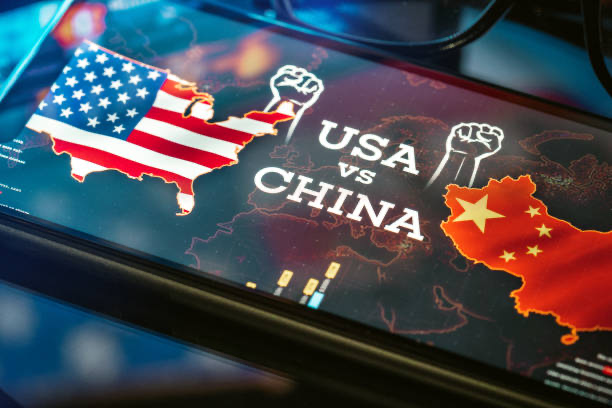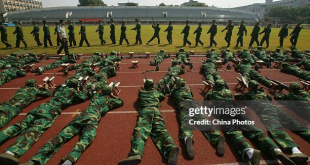By staff writer

The trade tensions between the United States and China—two of the world’s largest economies—have had ripple effects far beyond their borders. While headlines tend to focus on tariffs, supply chains, and corporate giants, the impact on developing regions such as Africa is less visible but equally significant. Africa, with its growing economies and strategic importance in global trade, is increasingly caught in the crossfire of U.S.-China trade wars. These tensions affect the continent’s economic growth, commodity prices, investment flows, and even its geopolitical alliances.
Africa’s economies are deeply integrated into global trade systems. China is the continent’s largest trading partner, with trade valued at over $250 billion in 2023, while the U.S. remains a significant player, particularly in aid, security, and governance. When these two giants clash, Africa’s economies—reliant on both exports and foreign direct investment (FDI)—feel the shockwaves.
For instance, during the height of the U.S.-China trade war in 2018–2019, Beijing redirected some of its agricultural imports from the U.S. to African countries. While this initially seemed like an opportunity for African farmers, it was short-lived and unpredictable. Countries like Ethiopia and Kenya saw increased demand for certain commodities, but the sudden shifts strained their logistics and regulatory systems, revealing their limited capacity to respond to such global shocks.
Many African countries depend heavily on the export of raw materials—such as oil, copper, cobalt, and agricultural products—which are highly sensitive to global demand. The U.S.-China trade war dampened global growth expectations and weakened commodity prices, hurting exporters like Nigeria, Angola, and Zambia.
For example, Zambia, which depends on copper exports for over 70% of its foreign exchange earnings, faced serious fiscal challenges when prices dropped due to reduced Chinese industrial demand. The trade war, by curbing global manufacturing activity, indirectly depressed the prices of metals and minerals, forcing African exporters into tighter budget positions and increased borrowing.
The uncertainty caused by the trade war has also led to a shift in investment strategies. Chinese investors, facing rising tariffs and restrictions in the U.S., have increasingly turned to Africa as an alternative market and production hub. This trend has accelerated China’s Belt and Road Initiative (BRI) projects across the continent, with infrastructure investment in countries like Kenya, Djibouti, and Nigeria.
However, the benefits are mixed. While African nations welcome the influx of Chinese investment, some deals have sparked concerns over debt sustainability and local job displacement. At the same time, U.S. investors, wary of the trade war and its impact on global supply chains, have often adopted a wait-and-see approach, delaying investments in African markets they perceive as unstable or high-risk.
Another indirect consequence of the U.S.-China trade war is the reshuffling of global supply chains. Companies, aiming to avoid tariffs, have begun relocating manufacturing from China to other parts of the world—including parts of Africa. Ethiopia and Egypt, for instance, have become attractive for textile and electronics manufacturing due to lower labor costs and improving infrastructure.
But while this trend holds potential, Africa’s overall readiness remains limited. Poor logistics, unreliable energy supplies, and bureaucratic red tape mean that the continent cannot yet fully capitalize on the opportunity to become a major alternative production center. Without strategic investments in skills, technology, and governance, Africa risks being a peripheral player in this global restructuring.
Beyond economics, the U.S.-China trade war also has a geopolitical dimension that affects Africa. Both nations are competing for influence on the continent, offering infrastructure, loans, military training, and technology. The trade conflict has heightened this competition. The U.S. has increased diplomatic efforts, offering alternatives to Chinese tech companies like Huawei and proposing more transparent development financing through initiatives like Prosper Africa and the Build Back Better World (B3W) plan.
African governments now find themselves navigating a complex landscape where aligning too closely with one power could jeopardize relations with the other. The result is a delicate balancing act, as nations seek to extract the most benefit without becoming pawns in a broader geopolitical struggle.
The U.S China trade war illustrates how deeply interconnected the global economy has become. While Africa is not a direct combatant in this economic conflict, it is significantly affected by its consequences. From volatile commodity prices and redirected investments to supply chain opportunities and geopolitical pressures, the continent is both vulnerable and strategically important.
To mitigate these impacts and seize emerging opportunities, African nations must invest in diversification, regional integration, and policy reforms. Only then can they transform these global shocks into sustainable development gains and assert greater agency in the evolving global order.
 Africa -China Review Africa -China Cooperation and Transformation
Africa -China Review Africa -China Cooperation and Transformation
